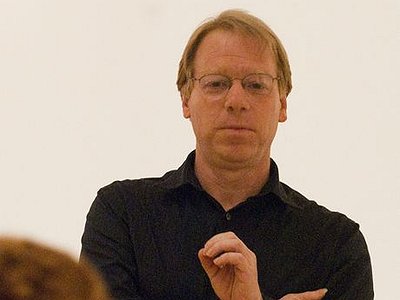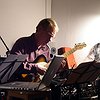The contingency conundrum
A guitarist and composer from Buffalo, Michael Pisaro explores the use of silence as one of his key compositional tools. In 1993 he joined Jurg Frey, and Manfred Werder - and later Radu Malfatti and Craig Shepard - to become a member of the Wandelweiser Group of composers, originally founded by Antoine Beuger and Burkhard Scholthauer. Taking their cue from Cage's seminal 4'33", the ensemble creates works frequently referred to as 'silent music' - although it is a lot more about exploring the fruitful relationship between sound and the absence of sound than a fetishisation of silence as such. Pisaro has found it hard to explain his aesthetic predilection ("There’s no reason to love this music. One just does (or one doesn’t).", as he once pointed out). And yet, it is gaining new followers with each year. Along with teaching composition at The California Institute of the Arts, Pisaro has composed over 80 works that have been performed all over the world at music festivals and smaller venues. Taking cues from poetry and literature in the past, Pisaro now follows his interest in field recordings to further explore the relationship between listening and sound.
When did you start composing - and what or who were your early passions and influences?
I started composing in high school. At the time, around 1977, I was interested in free jazz like The Art Ensemble of Chicago, John Coltrane, Ornette Coleman, Cecil Taylor, various forms of new wave and avant-rock like Roxy Music, Brian Eno, David Bowie, Jimi Hendrix, The Clash, Talking Heads, Elvis Costello, country blues especially Robert Johnson and I was getting to know the classical composers. I read the Schwann classical record catalogue religiously. For those who don’t remember or never saw it, it listed all the available recordings of classical works. I marked off pieces I’d heard and would carefully plot out records I was going to buy or check out from the library.
Chicago, where I grew up, had fantastic radio. The great WFMT published listings of what they were going to program and I followed those closely for years. I played electric guitar and bands and lots of crappy classical guitar music which I hope didn’t influence me very much.
What do you personally consider to be incisive moments in your work and/or career?
Most decisive was meeting Kunsu Shim and then shortly thereafter Antoine Beuger and Jürg Frey in around 92/93, the beginnings of the Wandelweiser group. This literally saved years of my compositional life. I was moving tentatively in a direction which these gentlemen were already exploring in a much more radical way.
What are currently your main compositional challenges?
It’s always the same struggle to write something worth hearing. That has not gotten easier over the years.
I am still deeply challenged by the idea of silence–which has come to mean contingency to me. Trying to understand what contingency means in musical and compositional terms is a genuine challenge. Hopefully each piece makes a little headway.
What do you usually start with when composing?
It could literally be anything. My friend, the artist Mauser, used to say that we should respond to impulses: by which I think he meant, something in the world that has stirred you in a deep but subtle way. Determining what that impulse is and where it might lead is like very slow detective work.
How do you see the relationship between timbre and composition?
That’s a much more complex question that it might seem. Much of the idea behind writing an indeterminate score, is to allow a very specific timbre to instance itself in a moment. All forms of composition, except perhaps for making recordings or electronic music, abstract timbre to some degree.
What do improvisation and composition mean to you and what, to you, are their respective merits?
Under the terms above, I don’t see them as vastly different. No artist can play without some kind of plan: whether it’s conscious or not, patterns will have to emerge, and they come from somewhere. The invention of pattern, on any level, does not really happen spontaneously: it’s the result of work and thinking, even for people who mostly improvise. But the elements that give music life do happen spontaneously. Remaining attentive to this is for me the greatest challenge of performing.
Do you feel it important that an audience is able to deduct the processes and ideas behind a work purely on the basis of the music? If so, how do you make them transparent?
Not at all. Listeners should feel free to listen in whatever way that fascinates them. At some point in the process it might include trying to understand how something was made, and I’m usually happy to tell people about that. But it’s very far from being a requirement for listening. On the whole, it’s more interesting to hear what people, without knowledge of the processes used, make of it.






